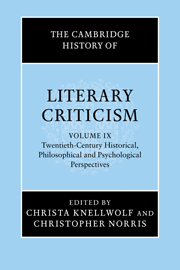Book contents
- Frontmatter
- Introduction
- HISTORY
- MARXISM AND POST-MARXISM
- FROM CULTURAL POETICS TO CULTURAL STUDIES
- 11 Mikhail Bakhtin: historical becoming in language, literature and culture
- 12 Cultural studies
- 13 Literature and the institutional context in Britain
- PSYCHOANALYTIC APPROACHES
- GENDER AND SEXUALITY
- COLONIALISM, POST-COLONIALITY, NATION AND RACE
- MODERNITY AND POSTMODERNISM
- PHILOSOPHY, AESTHETICS AND LITERARY CRITICISM
- INTERDISCIPLINARY APPROACHES
- Bibliography
- Index
- References
12 - Cultural studies
from FROM CULTURAL POETICS TO CULTURAL STUDIES
Published online by Cambridge University Press: 28 March 2008
- Frontmatter
- Introduction
- HISTORY
- MARXISM AND POST-MARXISM
- FROM CULTURAL POETICS TO CULTURAL STUDIES
- 11 Mikhail Bakhtin: historical becoming in language, literature and culture
- 12 Cultural studies
- 13 Literature and the institutional context in Britain
- PSYCHOANALYTIC APPROACHES
- GENDER AND SEXUALITY
- COLONIALISM, POST-COLONIALITY, NATION AND RACE
- MODERNITY AND POSTMODERNISM
- PHILOSOPHY, AESTHETICS AND LITERARY CRITICISM
- INTERDISCIPLINARY APPROACHES
- Bibliography
- Index
- References
Summary
Since the 1960s the discipline of cultural studies has taken root throughout the English-speaking world and beyond. It has developed a wide range of approaches to the study of culture which are usually characterised by attention to political, ideological, social and historical factors, in particular the relationship between culture and power. In the course of its development cultural studies has challenged established cultural canons and disciplinary boundaries and has focused attention on those aspects of culture which have been excluded by longer established humanities disciplines. Thus, for example, cultural studies has looked extensively at cultural theory, popular culture and the media. The development of cultural studies, in its turn, has influenced other disciplines, for example, literary studies, encouraging a more inclusive approach to the range of texts studied and greater attention to theory, context and the institutions that constitute the literary discursive field.
Since the late 1960s cultural studies has become an established international discipline, yet its early roots are to be found in Britain, where they are closely intertwined with the development of literary studies. In its formative years cultural studies defined itself both in relation to and against what is known in Britain as the ‘culture and civilisation’ tradition, i.e. that tradition of English literary and cultural criticism that begins with Matthew Arnold in the 1860s.
For Arnold, culture was an explicitly political question, directly linked to class relations in nineteenth-century Britain. With the expansion of literacy among the working classes, the implementation of compulsory elementary education and the rise of trade unionism, social unrest and even social revolution increasingly came to be seen as real threats to existing social relations.
- Type
- Chapter
- Information
- The Cambridge History of Literary Criticism , pp. 155 - 164Publisher: Cambridge University PressPrint publication year: 2001

